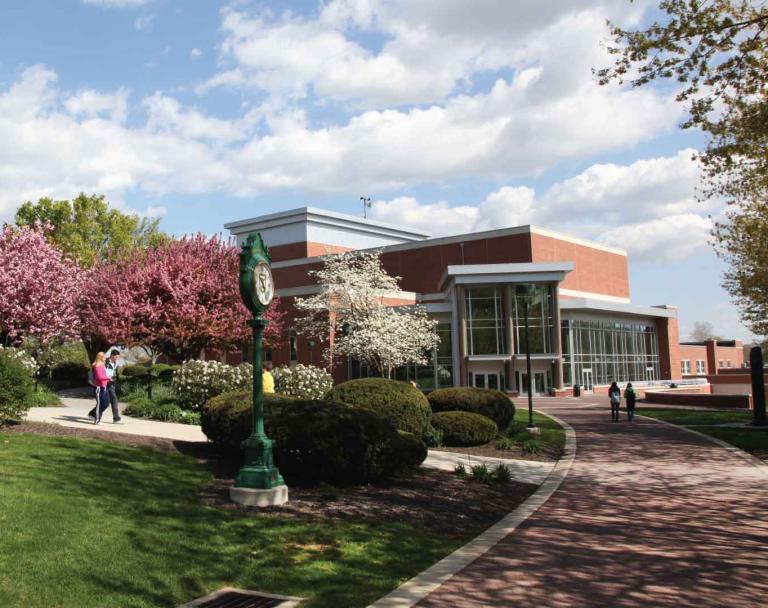Erec Smith

Is that a rhetorical question? Love of rhetoric drove professor to teach
Dr. Erec Smith of York College of Pennsylvania, who recently was named one of York County’s Most Influential People, was spurred on by the desire to explore a topic that fascinated him.
As a kid, Erec Smith wasn’t sure what he wanted to be when he grew up. But he knew for certain what he didn’t want to be.
“I always said literally anything but a teacher,” recalls Dr. Smith, Associate Professor of Rhetoric and Composition (i.e., a teacher) at York College of Pennsylvania. But Dr. Smith was drawn to teaching by his fascination with rhetoric.
“When you feel passionate about something, you want to tell everybody. You want everyone to feel passionate about it or at least understand it,” he says. “That’s why teaching is so important to me.
“Getting paid to read books and then talk about them is a nice perk, too.”
Recently named one of York County’s Most Influential People for 2022: Education by the York Daily Record, Dr. Smith challenges his students to recognize rhetoric and understand how it is used in the world around them.
Educational influence
Dr. Smith has served in a range of capacities over the years in many opportunities that exist outside of the York College campus. He co-founded Free Black Thought to provide an online platform for viewpoint diversity in Black voices. He’s also a writing fellow for the Heterodox Academy, a nonprofit that boasts free speech and free thought on college campuses.
Dr. Smith volunteers as an advisor for the Foundation Against Intolerance and Racism and Counterweight, an organization that offers a classically liberal approach to conversations on empowerment and race.
He’s also an avid collaborator. Dr. Smith is working on a project with Jason Littlefield, a Texas-based educator, on an organization called EmpowerED Pathways, which offers free courses on how to discuss alternatives to diversity, equity, and inclusion trainings to focus on the empowerment of minorities.
In the York community, Dr. Smith has served as chair of the York YWCA Racial and Social Justice Committee. He’s also program coordinator for "United to Prevent Targeted Violence," a non-partisan program that will bring together residents of Adams, Dauphin, Franklin, and York counties to work across divides to prevent targeted violence.
Why rhetoric?
People don’t talk to their friends the same way they talk to their parents. Even if delivering the same message, they won’t say it the same way. That, in the simplest terms, describes rhetoric.
Rhetoric can help us understand how to talk to people who don’t agree with us, something that is often absent from society right now, says Dr. Smith. He teaches classes about rhetoric in the workplace, in civic life, and in history.
“It’s everywhere. That’s really the gist of why I’m doing this,” he says. “I want people to know it's everywhere.”
Dr. Smith learned early on that different groups of people—the various races, socioeconomic groups, religious organizations—have different views and interpretations of the world. He experienced that in how he was received by people throughout his life.
“Although I was the same exact person, I meant different things to different people,” he says. Exploring the how and why of that, and teaching it to others, became his life’s work.
Spreading the message
Outside of class, Dr. Smith lectures and presents talks online about rhetoric. He’s also president of a nonprofit organization that showcases viewpoint diversity within Black America.
“You can’t have rhetoric without viewpoint diversity,” he says.
Dr. Smith’s classes often are the first setting where students are asked to think about why they interpret situations as they do.
“Every once in a while you see something in a student’s eye like a light bulb went off,” he says. But after nine years of teaching at York College, he doesn’t expect all students to suddenly devote their lives to rhetoric.
“I just really want to help them understand the text to the best of their ability, and understand and voice their conclusions,” he says.
Connecting rhetoric to current events, political cycles, or activist movements helps engage some students.
“Rhetoric is everywhere. People make rhetorical choices when they’re trying to push their agenda or start a movement,” Dr. Smith says. “So it’s not hard to understand why rhetoric is important.”
Beneath what has become his passion for teaching there is always his desire to understand, and to help others understand, the importance of rhetoric.
“It drives me to teach, it drives me to talk,” Dr. Smith says. “It’s kind of the driving force behind all of this.”

